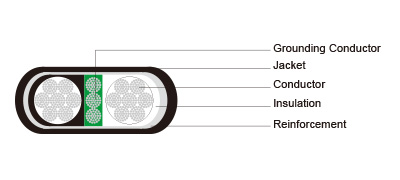
| Applications | These flat parallel cables are designed for use on D.C. off-track mining equipment, such as D.C. shuttle cars, drills,cutting and loading machines. |
| Standards | ICEA S-75-381/NEMA WC 58 ASTM B 172 ASTM B 33 CAN/CSA C22.2 No. 96 |
| Construction | |
| Conductors | Stranded annealed tinned copper conductor. |
| Insulation | Ethylene Propylene Rubber (EPR). |
| Grounding Conductor | Tinned copper conductor with a green outer covering. |
| Reinforcement | Synthetic yarn. |
| Jacket | Heavy-duty/extra-heavy-duty Chlorinated Polyethylene (CPE), black. (Cables having a nominal outside diameter of more than 2.0 inches require extra-heavy-duty jackets.) |
| Options | Other jacket materials such as CSP/PCP/NBR/PVC are available upon request. Two-layer jacket with reinforcing fibre between the two layers can be offered as an option. |
| Mechanical and Thermal Properties | Minimum Bending Radius: 6×OD Maximum Operating Temperature: +90℃ |
Dimensions and Weight:
|
Construction |
No. of Strands |
Grounding Conductor Size |
Nominal Insulation Thickness |
Nominal Jacket Thickness |
Nominal Overall Diameter Height×Width |
Nominal Weight |
Ampacity |
||||
|
No. of cores×AWG/kcmil |
- |
AWG/kcmil |
inch |
mm |
inch |
mm |
inch |
mm |
lbs/kft |
kg/km |
A |
|
2×6 |
133 |
8 |
0.06 |
1.5 |
0.080 |
2.0 |
0.56×1.02 |
14.2×25.9 |
500 |
744 |
95 |
|
2×4 |
259 |
7 |
0.06 |
1.5 |
0.095 |
2.4 |
0.61×1.15 |
15.5×29.2 |
635 |
945 |
127 |
|
2×3 |
259 |
6 |
0.06 |
1.5 |
0.095 |
2.4 |
0.68×1.26 |
17.3×32.0 |
785 |
1170 |
145 |
|
2×2 |
259 |
5 |
0.06 |
1.5 |
0.095 |
2.4 |
0.73×1.35 |
18.5×34.3 |
935 |
1390 |
167 |
|
2×1 |
259 |
4 |
0.08 |
2.0 |
0.110 |
2.8 |
0.81×1.55 |
20.6×39.4 |
1185 |
1760 |
191 |
|
2×1/0 |
259 |
3 |
0.08 |
2.0 |
0.125 |
3.2 |
0.93×1.67 |
23.6×42.4 |
1470 |
2190 |
217 |
|
2×2/0 |
329 |
2 |
0.08 |
2.0 |
0.125 |
3.2 |
0.99×1.85 |
25.1×47.0 |
1790 |
2660 |
250 |
|
2×3/0 |
413 |
1 |
0.08 |
2.0 |
0.140 |
3.6 |
1.03×2.00 |
26.2×50.8 |
2145 |
3190 |
286 |
|
2×4/0 |
532 |
1/0 |
0.08 |
2.0 |
0.140 |
3.6 |
1.10×2.10 |
27.9×53.3 |
2545 |
3790 |
328 |
Ampacity-Based on a conductor temperature of 90℃ and an ambient air temperature of 40℃, per ICEA S-75-381.


